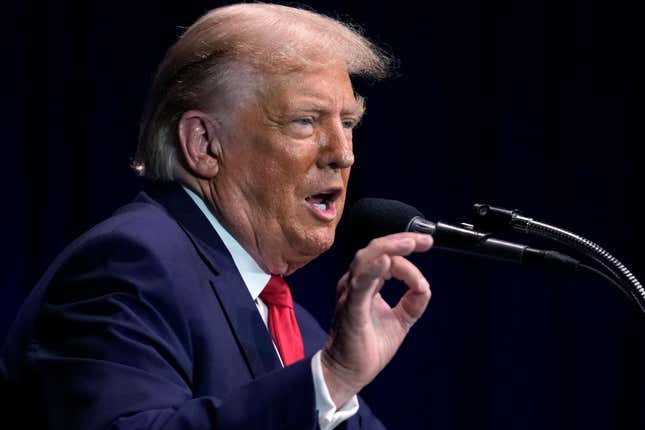
NEW YORK (AP) — Donald Trump obtained hundreds of millions of dollars in loans using financial statements that a court has since deemed fraudulent, a retired bank official testified Wednesday at the former president’s New York civil fraud trial.
Trump’s “statements of financial condition” were key to his approval for a $125 million loan in 2011 for his golf resort in Doral, Florida, and a $107 million loan in 2012 for his Chicago hotel and condo skyscraper, former Deutsche Bank risk management officer Nicholas Haigh testified.
But although the bank didn’t conduct its own full appraisals of Trump's properties, it sometimes gave sizable “haircuts” to the values he'd placed on such holdings as Trump Tower and his golf courses, Haigh said.
“I think the phrase we used might have been ‘sanity checks’ on the numbers,” he said.
Those numbers helped Trump secure bigger loans and lower interest rates, said Haigh, who headed the risk group for the bank’s private wealth management unit from 2008 to 2018.
A judge last month ruled that the former president and his company, the Trump Organization, committed years of fraud by exaggerating the value of Trump’s assets and net worth on the financial statements he gave to banks, insurers and others to make deals and secure loans.
Trump's longtime finance chief, Allen Weisselberg, acknowledged in testimony Tuesday that information in the financial statements wasn't always accurate.
Trump denies any wrongdoing, emphasizing disclaimers on the documents that he says alerted lenders to do their own homework. The disclaimers say, among other things, that the financial statements aren't audited and that others “might reach different conclusions” about Trump's financial position if they had more information.
“It’s like a ‘buyer beware’ clause,” he told reporters in the courthouse hallway last week. Trump has claimed that banks he did business with weren't harmed, made lots of money in his deals and “to this day have no complaints."
Haigh is testifying in a trial in New York Attorney General Letitia James’ fraud lawsuit against Trump, his company and top executives. It’s the first time a bank official has testified in court about the impact Trump’s financial statements had on his ability to obtain loans.
Deutsche Bank’s rules required Trump to act as a guarantor for the Doral and Chicago loans, in addition to putting up the Miami-area resort and Wabash Avenue skyscraper as collateral.
Deutsche Bank’s private wealth management unit, which handled the loans, wouldn’t have approved them without a “strong financial guarantee” from Trump, Haigh said.
Haigh said he reviewed Trump’s financial statements before approving the loans and, at the time, had no reason to doubt their validity.
The documents portrayed Trump as a wealthy businessman, heavily invested in golf courses and other real estate with strong cash flow and little debt, Haigh said. Deutsche Bank representatives also met with Trump Organization executives to go over the information, and the bankers looked at bank account and brokerage statements to verify his cash holdings, he said.
“I assumed that the representations of the assets and liabilities were broadly accurate," Haigh said of Trump’s financial statements.
Trump's 2011 financial statement listed his net worth as $4.3 billion, though Deutsche Bank pegged it around $2.4 billion in an internal credit report as he sought the Doral loan. The bank knocked 75% off the worth he'd given for planned developments, with the internal document citing “the uncertainty in valuing undeveloped land,” for example. The bankers halved the value he'd listed for his golf courses and had a $94 million difference of opinion over how to account for golf membership deposits among his liquid assets.
“Does this indicate that the bank had the ability to go review the cash holdings and adjust them?” Trump lawyer Jesus M. Suarez asked Haigh.
The former banker said he wasn't certain exactly what his colleagues had seen about the membership deposits, but “it looks to me as though the lending officers were, to some extent, relying on information provided to them by the client’s people.”
The bank imposed a loan condition requiring that Trump, as guarantor, maintain a minimum net worth of $2.5 billion, excluding any value derived from his celebrity.
"As the ultimate decider, I needed to be comfortable with the terms of the loan, including the covenants that protected the bank,” Haigh said. The $2.5 billion benchmark, he said, was meant to safeguard the bank if the market went bad.
Trump, the Republican front-runner in next year’s election, attended the trial's first three days last week. He's expected to testify later in the trial.
In a pretrial ruling last month, Judge Arthur Engoron found that Trump, Weisselberg and other defendants committed years of fraud by exaggerating the value of Trump’s assets and net worth on his financial statements.
As punishment, Engoron ordered that a court-appointed receiver take control of some Trump companies, putting the future oversight of Trump Tower and other marquee properties in question. An appeals court on Friday blocked enforcement of that aspect of Engoron’s ruling, at least for now.
The civil trial concerns allegations of conspiracy, insurance fraud and falsifying business records. James, a Democrat, is seeking $250 million in penalties and a ban on Trump doing business in New York.